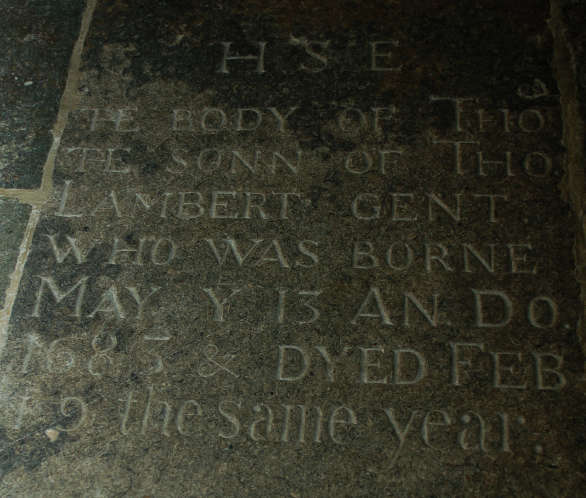The last day of the year used to be March 24th. The first day of the new year used to be March 25th. 24th March 1683 was followed by Lady Day 25th March 1684. 31st December 1684 was followed by 1st January 1684, the same year. The new year did not come in on January 1st. 24th March 1684 was followed by 25th March 1685.
A nice piece of evidence for this can be found in the floor of Salisbury cathedral. There is a memorial stone here in the north choir aisle outside the Morning Chapel. The inscription reads:
H S E The body of Tho[mas] the sonn of Tho. Lambert gent. who was borne May ye 13 An[no] Do[mini] 1683 & dyed Feb. 19 the same year.

This states that a child called Thomas was born on May 14th 1683 and died on February 19th 1683. This is not incorrect as at this time the year did not change to 1684 until March 25th. February came after May in the year 1683. (HSE stands for the latin hic sepultus est which translates as here is buried.)
This was so up to when 24th March 1750 was followed by 25th March 1751. Parliament changed things, including decreeing that Wednesday 2nd September 1752 be followed by Thursday 14th September 1752; skipping 11 days. This same act of parliament decreed that 31st December 1751 be followed by 1st January 1752. To this day we still change the year on January 1st.
Taxes used to be paid on the first day of the year. This used to be March 25th. The city of London bankers were not going to pay their 1752 taxes early. When March 25th 1753 came they still regarded this as 11 days early so they eventually paid on April 5th 1753. When the year 1800 came there was no leap day as 1800 does not divide by 400; the rule for centuries. The bankers again claimed back this missing day by not paying until a day later, namely April 6th. The tax year still remains thus, starting on April 6th every year. The bankers did not claim the extra day for the year 1900, another year which was not a leap year. The year 2000 was a leap year so no problem here.
Thus there was no January or February in 1751, nor was there much of March. The year 1751 started on March 25th and ended on December 31st. Thus the year 1751 in England only had 282 days (7+30+31+30+31+31+30+31+30+31). 1752 started on January 1st, there was a 29th February and 11 days missed out, namely September 3rd to September 13th inclusive. Thus 1752 in the UK had only 355 days (31+29+31+30+31+30+31+31+19+31+30+31).
JAC 20071029/20110208/20110222
Click here to go back to the Salisbury Home Page
StatCounter.com counter: